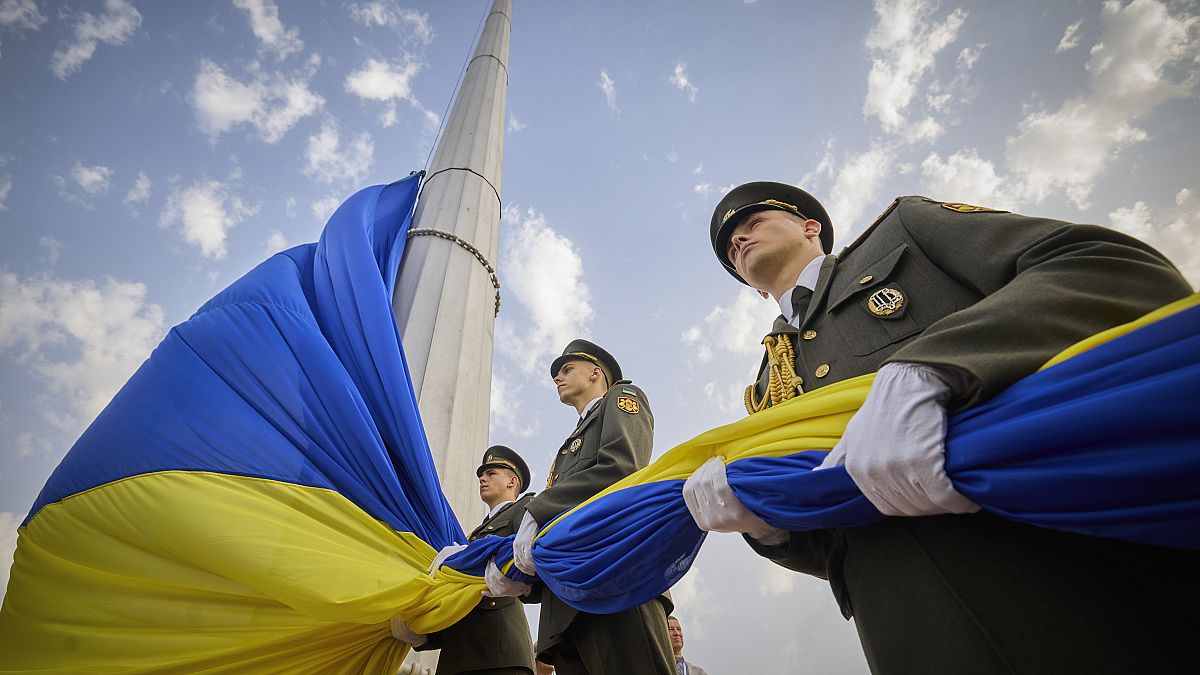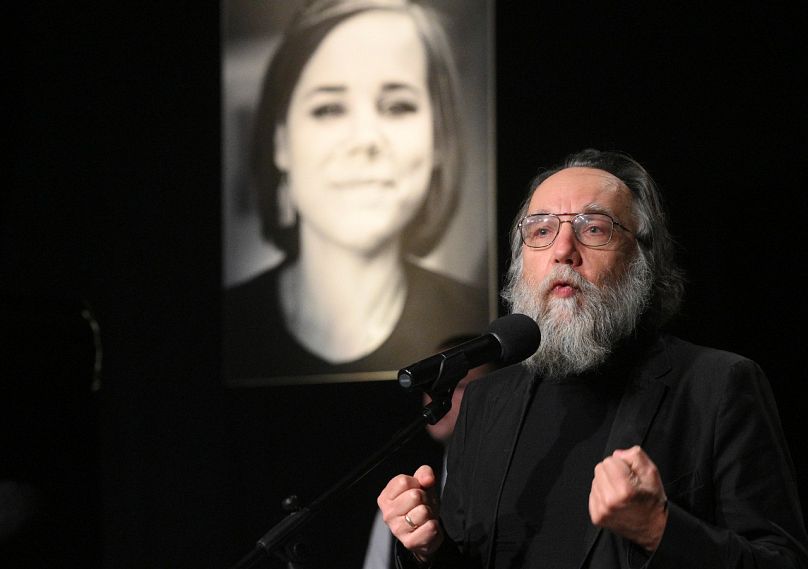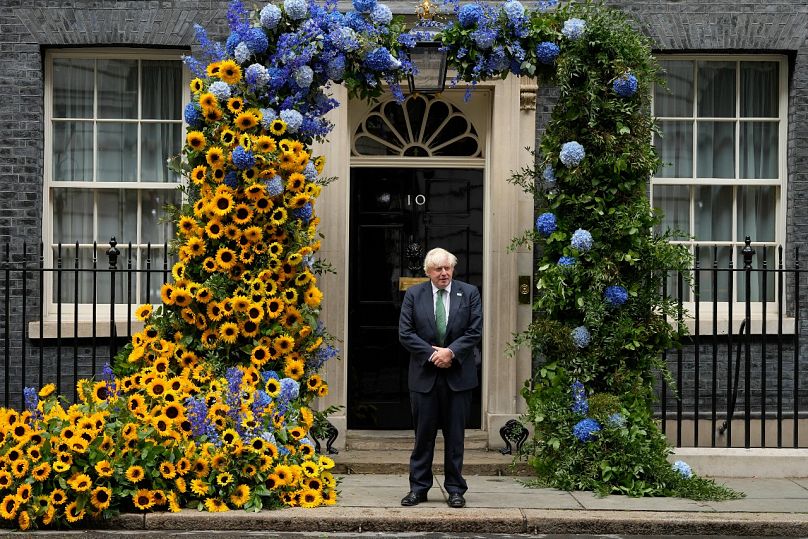From fears that Russia will increase attacks to coincide with Ukraine's independence day on Wednesday to Germany said to be planning further military aid to Ukraine, these are some of the top developments in the war on Tuesday.
This is a summary of Tuesday's developments. Click here for Wednesday's latest updates in the war as Ukraine marks its independence day on the six-month anniversary of the Russian invasion.
1. Independence Day events curbed amid warnings of more Russian attacks
Ukrainian cities have begun imposing curbs on events linked to the country's Independence Day on Wednesday, amid fears of intensified Russian attacks.
The anniversary commemorates freedom from Soviet rule and also marks half a year since the Russian invasion.
On Tuesday, the American Embassy in Kyiv reiterated a security warning from the US State Department, saying Russia was stepping up efforts to launch strikes against civilian and government targets in Ukraine in the coming days.
American citizens still in Ukraine have been urged to leave the country immediately.
The alert came after the US intelligence community declassified a finding on Monday, saying that Russia would increasingly target Ukrainian civilian infrastructure.
Kyiv has banned public events related to the occasion from Monday to Thursday. There are fears of renewed Russian rocket attacks on the capital, even though it lies far from the front lines and has only rarely been hit since Ukraine repelled a ground offensive in March.
In Kharkiv, the northeastern city that has come under frequent and deadly longer-range artillery and rocket fire, Mayor Ihor Terekhov announced an extension to an overnight curfew to run from 4 pm to 7 am, effective from Tuesday to Thursday.
Curbs on events have also been imposed in the port of Mykolaiv, near Russian-held territory to the south. Regional governor Vitaliy Kim said there were plans for residents to be ordered to work from home on Tuesday and Wednesday, urging people not to gather in large groups.
Fears of attacks have mounted after Russia's Federal Security Service (FSB) accused Ukrainian agents on Monday of killing Daria Dugina, daughter of a Russian ultra-nationalist ideologue, in a car bomb attack near Moscow. Ukraine denies involvement.
Ukrainian President Volodymyr Zelenskyy has warned that Moscow could try "something particularly ugly" in the run-up to Independence Day.
2. Memorial service held for slain TV journalist as nationalists vow revenge
Hundreds of people paid tribute to Daria Dugina at a memorial service for the 29-year-old at a TV production centre in Moscow.
His voice breaking, her father Alexandr Dugin said his daughter, a TV commentator, "died for the people, died for Russia".
"The huge price we have to pay can only be justified by the highest achievement, our victory,” Dugin said. “She lived for the sake of victory, and she died for the sake of victory. Our Russian victory, our truth, our Orthodox faith, our state."
Her father was widely believed to be the intended target. Dugin is a prominent philosopher and writer who advocates a vast new Russian empire and is a vehement supporter of the country's war in Ukraine. He is believed to have had a major influence on Vladimir Putin.
During the service, Dugin shared what he said were his daughter's last words to him at a nationalist festival they both attended just before her death: "Father, I feel like a warrior, I feel like a hero. I want to be one, I don’t want any different fate. I want to be with my people, with my country."
Authorities said Dugina was killed when a remotely controlled explosive device planted in her SUV blew up on Saturday night as she was driving on the outskirts of Moscow, ripping the vehicle apart and killing her on the spot. Russian nationalists have responded by calling for strikes on Ukraine to be ramped up.
"Our special services have no relation to that," Oleksiy Danilov, secretary of Ukraine’s National Security and Defence Council, said late on Monday as he reiterated Kyiv's denial of involvement.
Putin sent a letter of condolences to Dugin and his wife, denouncing the “cruel and treacherous” killing and saying that Dugina “honestly served people and the Fatherland, proving what it means to be a patriot of Russia with her deeds”.
He posthumously awarded Dugina the Order of Courage, one of Russia’s highest medals.
Russia’s Federal Security Service (FSB), the main successor to the KGB, blamed "Ukrainian special services” for Dugina's killing.
It claims to have identified a Ukrainian citizen, Natalya Vovk, as having carried it out — saying she came to Russia in July with her 12-year-old daughter, rented a flat in the building where Dugina lived in order to shadow her, attended the nationalist festival just before the killing, and drove to Estonia afterwards using a different vehicle licence plate.
Estonian Foreign Minister Urmas Reinsalu dismissed the Russian claim. "We regard this as one instance of provocation in a very long line of provocations by the Russian Federation," he said, without commenting further.
Dugin, dubbed “Putin’s brain” and “Putin’s intellectual” by some in the West, has been a prominent proponent of the "Russian world" concept. The spiritual and political ideology emphasises traditional values, the restoration of Russia’s global influence, and the unity of all ethnic Russians as well as Russian speakers throughout the world.
The writer helped popularise the “Novorossiya,” or “New Russia” concept that Russia used to justify its annexation of Crimea and support of separatist rebels in eastern Ukraine in 2014. He has also promoted authoritarian leadership in Russia and scorned liberal Western values and has been slapped with US and European Union sanctions.
His daughter expressed similar views and had appeared as a commentator on the TV channel Tsargrad, where Dugin had served as chief editor.
Dugina herself was sanctioned by the US in March for her work as chief editor of United World International, a website that Washington has described as a source of disinformation.
3. Zelenskyy vows to restore Ukrainian rule in Crimea as leaders pledge support
Ukrainian President Volodymyr Zelenskyy opened an international conference on Crimea on Tuesday by saying Kyiv would restore Ukrainian rule over the Russia-annexed region.
"To overcome terror, it is necessary to gain victory in the fight against Russian aggression. It is necessary to liberate Crimea. This will be the resuscitation of world law and order," he told the "Crimea Platform" summit.
The gathering is an initiative of the main states supporting Ukraine that existed before Russia invaded the country on 24 February. It comes as the conflict enters its seventh month on Wednesday.
Zelenskyy made a similar pledge earlier as he attended the raising of Ukraine's flag at the memorial complex in Ukraine to mark National Flag Day on Tuesday.
The president vowed that the flag of Ukraine would again wave in all temporarily occupied territories of Ukraine, including Crimea. "The blue and yellow flag of Ukraine will again fly where it rightfully should be," he said.
The ceremony was held at the National Museum of the History of Ukraine, built in Kyiv to honour victims of WWII and was attended by the commander-in-chief of the Armed Forced of Ukraine and other top officials.
Visiting Ukraine on Tuesday as part of the "Crimea Platform" summit, Polish President Andrzej Duda offered more support for Ukraine and called for an end to the Russian occupation of Crimea. He urged global leaders not to turn a blind eye to Russian aggression.
Poland is one of the EU's strongest supporters of Ukraine and the biggest critics of Russia. Nearly six million Ukrainian refugees have crossed the border into Poland since the February invasion. Poland, a NATO and European Union member state, has often criticised some other EU nations for not doing more to help Ukraine.
"We welcome our friend to the capital!" the Ukrainian Border Guard Service wrote on Telegram, accompanying its message with a video showing Duda being welcomed at Kyiv station after arriving by train.
Poland, which spent decades under Soviet domination from Moscow after World War Two, is the third largest provider of military support to Ukraine behind the United States and Britain, according to the Warsaw government.
Pawel Szrot, the head of the Polish presidential administration, said earlier that Duda intended to continue to help Kyiv, including politically by helping to "persuade other countries" to support the Ukrainians.
French President Emmanuel Macron urged the international community to show "no weakness, no spirit of compromise" against Russia.
"It is a matter of freedom for all of us, and of peace in all parts of the globe," he said in a video message to the summit.
Macron once again called on Russia "to cease hostilities, to withdraw its troops from all Ukrainian soil and to choose diplomacy to rebuild peace". The Europeans are ready to support Ukraine's "fight" "in the long term", he added.
"France and the European Union, along with many of Ukraine's allies and friends, are doing what is necessary to support your struggle," he said. "Our determination has not changed and we are ready to maintain this effort in the long term.".
UK Prime Minister Boris Johnson repeated assurances of British support to Ukraine on Tuesday during his virtual address at the Crimea Summit.
"We will never recognize Russia's annexation of Crimea or any other Ukrainian territory," he said.
"We must continue to give our Ukrainian friends all the military, humanitarian, economic and diplomatic support that they need until Russia ends this hideous war."
4. More Russian strikes near Zaporizhzhia despite nuclear safety fears
The Ukrainian military said on Tuesday that Russia has carried out artillery and air strikes in the Zaporizhzhia region, where fighting near Europe's largest nuclear power plant has raised fears of a catastrophic nuclear incident.
Ukraine's General Staff said Russia fired artillery and conducted air strikes in several towns in the area, where Russian forces captured the nuclear power plant shortly after they invaded on February 24.
Artillery and rocket fire near the Zaporizhzhia nuclear reactor complex on the south bank of the Dnipro River has led to calls for the area to be demilitarised.
People living nearby said they were worried about the potentially disastrous consequences if one of the plant's six reactors was hit by shells.
Russia and Ukraine repeatedly accuse each other of firing at the Zaporizhzhia facility, which lies close to the town of Enerhodar that pro-Moscow forces now control.
"It's like sitting on a powder keg," town resident Alexander Lifirenko said on Monday.
The head of the city's civil-military administration said local authorities had a plan to cope with an accident and noted some shells were falling close to the plant's reactors.
"In case a reactor is hit, it will be not a local, but a global catastrophe," said Alexander Volga.
5. Another Russian ammunition depot catches fire, authorities blame heat
Ammunition stored in southern Russia near the border with Ukraine caught fire on Tuesday, the second such incident in a week, and a local official said high temperatures were to blame.
Vyacheslav Gladkov, the governor of Belgorod region, said people near the village of Timonovo were evacuated after the ammunition started to spontaneously combust. No one was injured, he said in a statement.
Last week inhabitants of Timonovo and Soloti, 15 kilometres from Ukraine, were evacuated after a nearby ammunition storage depot caught fire.
It was not clear from Gladkov's comments whether Tuesday's blaze had taken place in the same depot or among ammunition that had been moved.
Gladkov has in previous months blamed Ukrainian forces for a series of blasts in and around Belgorod, which is around 650 km south of Moscow.
Kyiv generally avoids claiming responsibility for explosions in Russian-occupied territory, sometimes suggesting sardonically that carelessness is to blame.
"In a few months we will find out whether Russian ammunition can explode because of the cold," Ukraine's defence ministry said in a tweet on Tuesday.
"The five main causes of sudden explosions in Russia are: winter, spring, summer, autumn and smoking."
6. Ukraine strikes separatist headquarters in Donetsk
Ukrainian forces shelled a building housing the local administration headquarters in the centre of Moscow-backed separatist-controlled Donetsk on Tuesday, Russian state-owned TASS news agency reported, citing Kremlin-installed officials.
Three people were killed in a series of strikes on Donetsk, which has been under the control of Russian-backed separatists since 2014, on Tuesday, the Russian-installed mayor of Donetsk said in a post on his Telegram channel.
A separatist official said at least one of the shells used in the attack was fired from a US-made HIMARS artillery system, Russian state news agencies reported.
Western officials have warned of a possible escalation in fighting in Ukraine this week, as Wednesday marks six months since Russia's invasion.
7. Seized yacht of Russian steel oligarch auctioned off in Gibraltar
A €75.1-million superyacht linked to a sanctioned Russian steel billionaire was auctioned on Tuesday in Gibraltar, court sources said, in what is understood to be the first sale of its kind since Russia invaded Ukraine in February.
The Axioma was granted entry into Gibraltarian waters and then impounded by the authorities in March after US bank JP Morgan said its alleged owner Dmitry Pumpyansky had reneged on the terms of a $20m (approx. €20.1m) loan.
The 72.5-metre vessel is being auctioned by the Gibraltar Admiralty Court. It was listed for one day, with closed bids to be sent electronically by midday on Tuesday, a court spokesman said.
Nigel Hollyer, the broker to the Admiralty marshal of the supreme court of Gibraltar who led the auction, told the Guardian newspaper last week that there had been an “unexpected late surge by prospective buyers” around the world, with more than 30 flying to Gibraltar to inspect the yacht in person.
Given the yacht was being sold through the courts, he said, prospective buyers seemed to believe they could pick up a "bargain".
The boat, which can sleep 12 people in six cabins, has a swimming pool, a jacuzzi, a spa, 3D cinema, jet skis and scuba diving equipment.
According to court papers, JP Morgan lent €20.5m to British Virgin Islands-listed Pyrene Investments Ltd, which was owned by Furdberg Holding Ltd. Furdberg's owner was Pumpyansky, who acted as guarantor for the loan.
The papers said Pyrene Investments defaulted on the terms of the loan after Pumpyansky, on 4 March, transferred all his shares in Furdberg to a third party and was then covered by sanctions.
The 58-year-old, who has an estimated fortune of €2 billion according to Forbes magazine, was sanctioned by the EU and the UK shortly after the invasion of Ukraine.
8. Germany to send half-billion euros worth of weapons to Ukraine, says government source
Chancellor Olaf Scholz said on Tuesday that Germany planned to deliver further arms to Ukraine, worth more than €500 million, a source told Reuters.
A participant at an online conference on Ukraine, which took place in Toronto, said that Germany planned to supply three additional Iris-T air defence systems, a dozen armoured recovery vehicles, 20 rocket launchers, precision ammunition and anti-drone systems.
The arms would be delivered in 2023, some possibly sooner, said the source, adding that Germany's parliamentary budget committee must still approve the supplies, which Scholz described as a contribution to the modernisation of Ukraine's armed forces.


